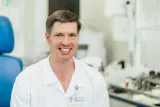Published: 10.08.2021
We talked to Jan Vodička, who is involved in research into smell and taste at the University of Pardubice. What is the clinician's view of Czech science? And how do innovations in medicine come into practice?
You are a doctor with clinical experience, you work at the Faculty of Medical Studies at the University of Pardubice. When did you decide to dedicate your career to science as well?
After completing my studies, I joined the Pardubice Hospital in the ENT department. I was lucky in having great mentors. The clinic was led by professors Arnošt Pellant and Viktor Chrobok. They placed great emphasis on medical-preventive care while encouraging us to constantly actively educate ourselves and purposefully address a specific topic. That includes scientific work.
Thanks to my scientific work, I am better acquainted with modern methods. However, we also test and develop such methods at the clinic that will ultimately help the patient, both in terms of diagnosis and treatment.
So you've actually gone from professional self-development to your own scientific work?
In our country 15 years ago, no one was intensively involved in the issue of smell or taste, so we wanted to establish a specialized department. We began to develop the initial simple methodology of olfactory examination in the Czech Republic. Professor Pellant gave me contacts for foreign departments, with which we have many professional debates, but we also visit each other. Ever since we started dealing with smell and taste at our clinic, more and more patients have started coming. Some of them also have treatment options.
So, your research is all about putting your innovations into practice?
My role is in a clinical application. We do not have facilities to do basic research. However, we have the opportunity to collaborate across the University and we are able to transfer our knowledge to clinical practice.
If you look at Czech science from the point of view of an academic, what do you think are the biggest current problems?
I see a big problem in the lack of funds, I often deal with that. I want to retain young promising talents, and they should not work for free. Verification of procedures in clinical practice is a long-term process and maintaining continuity of work is therefore very important.
But at the same time, I think that there is still room in medical and health faculties for students to be more involved in science. Greater emphasis should be placed on this and, at the same time, promising students should be rewarded for their quality work. They need to be encouraged not only to stay in clinical medicine, but also to continue their scientific work. Physicians who also work as scientists should be able to offer something extra, try to motivate students to start and continue their scientific work.
What do you mean by "something extra"?
We should take more care of promotion of the department and the projects that are run at it. Involve students in international cooperation from the very start. In the past, I was generally critical of promotion in general, because I believed that science should be enjoyed viscerally. Now I believe that the student must feel that he/she not only enjoys it, but also that it is useful. In addition, the work done should be duly paid.
I have heard an opinion that if a clinician-scientist is not part of a research team, then they may find themselves in a situation where they are left completely alone to do everything while doing science "in the evening at home under the desk lamp".
I have experience from Dresden, Germany, where there is a centre for smell and taste (clinical and research workplace at the same time). The doctors there treat patients at the ENT clinic and also have patients with olfactory disorders, some of whom will be included in the studies. The big difference is that clinical practice accounts for approximately 50% of the work load. They spend the rest of their time doing scientific work in another, quieter part of the ENT clinic building. There they have space to organize their ideas, create projects and write down what they need. Even the production of their scientific outputs is excellent.
So how is it going at our university?
We have a lot of interesting data. But we are pressed for time so much that the data remains unused. They have a clear line in Dresden. A project is developed, closed and then published properly. And they move to another project. Here, we complete the data collection, then present the results and usually move to the next project without publishing the results. This is a pity, because someone from abroad may respond to the outputs of our work, you can establish further cooperation. Publications are important and we are trying to improve this part in our workplace.
Is time the key issue?
Time is of the essence. But even if I have more time at work, it won't be until I get back home that I have space for thinking. The vast majority of my colleagues do so. It is almost impossible to find undisturbed space for scientific work in a medical environment.
In your opinion, what is the competitiveness of the Czech Republic in the field of medicine?
Regarding patients and medical-preventive care, we use the same methods as they do abroad. However, as part of scientific research abroad, they have at their disposal not only newer instrumentation, but above all more staff to work with the new instruments. I put the main emphasis on the difference in staffing.
If we compare it with German clinics, they are certainly further in the research processes. However, it is not the case that we are not equal partners abroad. We always bring new perspectives and methods that are simpler, but they will always listen to them with interest.
What are you working on now?
In the past, we worked intensively on olfactory examinations, and a simple screening test was created at our department. We are now aiming for examination of taste. Taste is sidelined a bit, but it needs to be examined very well, because an olfactory disorder is often associated with a taste disorder. The goal is to create a test that can be done in the comfort of your home. This examination of taste will also allow for lateral differentiation on the tongue.
Impaired taste can occur in many diseases. It can be diabetes or hypertension. We also encounter taste disorders in neurological patients or in ENT diseases. For example, the nerve (chorda tympani) may be broken and the patient does not feel any taste. Irradiation of head and neck tumours also leads to impaired taste perception. Our test will make it possible to find out what the state of taste is, how intensely the patient should salt or sweeten his/her food, and thus it will be beneficial for them.
You received support for this project in the form of a grant from the Technology Agency GAMA, proof of concept. What is the original idea?
Research is supported through covid projects. In the area of smell, the examination methodology is very well developed, but the taste lags far behind. Only during the covid-19 pandemic has there been more talk about smell, and thus there is a greater interest in examining not only smell, but also taste.
The idea of the project is as follows. If the patient has undergone covid-19 and a taste disorder persists, he/she will go to the pharmacy and take a test. They simply find out if the sense of taste is impaired or not. If so, he/she must pay attention to how to sweeten and salt his/her food, and will receive a doctor's recommendation for treatment.
In our long-term goal, we would like doctors to have a test at their disposal, which patients can use to examine themselves at home to find out whether the taste is impaired or preserved. Doctors will have a standard instrument at their disposal to examine the sense of taste. So far, the taste has been examined very rarely.
Who is the end user of your method?
The test is designed for three groups: first, for a patient who decides of his/her own free will to examine his/her sense of taste. Second, doctors (neurologists, ENT, but also practitioners) will be able to verify the state of taste. And third, we expect companies doing research to want to monitor treatment with new drugs also in relation to taste.
How long before you move into practice?
We have worked on several variants of the test, one of which turns out to be the most suitable. We needed to refine the test to such an extent that it is possible to do a self-examination and at the same time lateral differentiation. We now have a suitable carrier and we are approaching the ideal concentration. At the same time, we are testing an application where the phone or camera monitors whether the patient is being examined correctly. It is crucial that the patient maintain the correct procedure. I assume that in the autumn we will verify the methodology on larger population. So, we are currently just before the production of the test, which will be really definitive and verified on a larger group of healthy and sick people.
What is, for you personally, the path from idea through research to practice?
The transfer centre works very well at the University of Pardubice. I feel support from them. Whenever I need something, we look for possible solutions. Especially on the part of the administration.
But how do you perceive technology transfer yourself?
At first, I was a little unhappy with the technology transfer process. I felt a huge pressure on the commercial part, or rather a pressure for a company to start producing a product and for everything to start selling, and for the university to be the bearer of an idea, a patent, a utility model. I am primarily a doctor and I am interested in whether the method will be put into practice. Whether it will be a commercial success is secondary to me. Despite my initial misunderstanding, I must say that it makes sense. This forces us and our colleagues from other faculties to make the practical applicability of the test while dealing with the success of the promotion of the method in general.
And what about transfer in medicine?
Transfer in medicine is more complicated and everything takes many times as long. We will not have a medical device as a result of the project. This is for the next couple of years of approving, but we will definitely meet the safety requirements. If I compare it to the world, similar methods for examining smell and taste are also not, in the vast majority, medical devices.
The Centre for Technology Transfer should also take into account differences in the fields that apply for grants. Time and money requirements differ a lot.
The interview is adopted with permission from the portal Věda a výzkum
Eva Doležalová – Věda a výzkum/Photo: Michal Král


